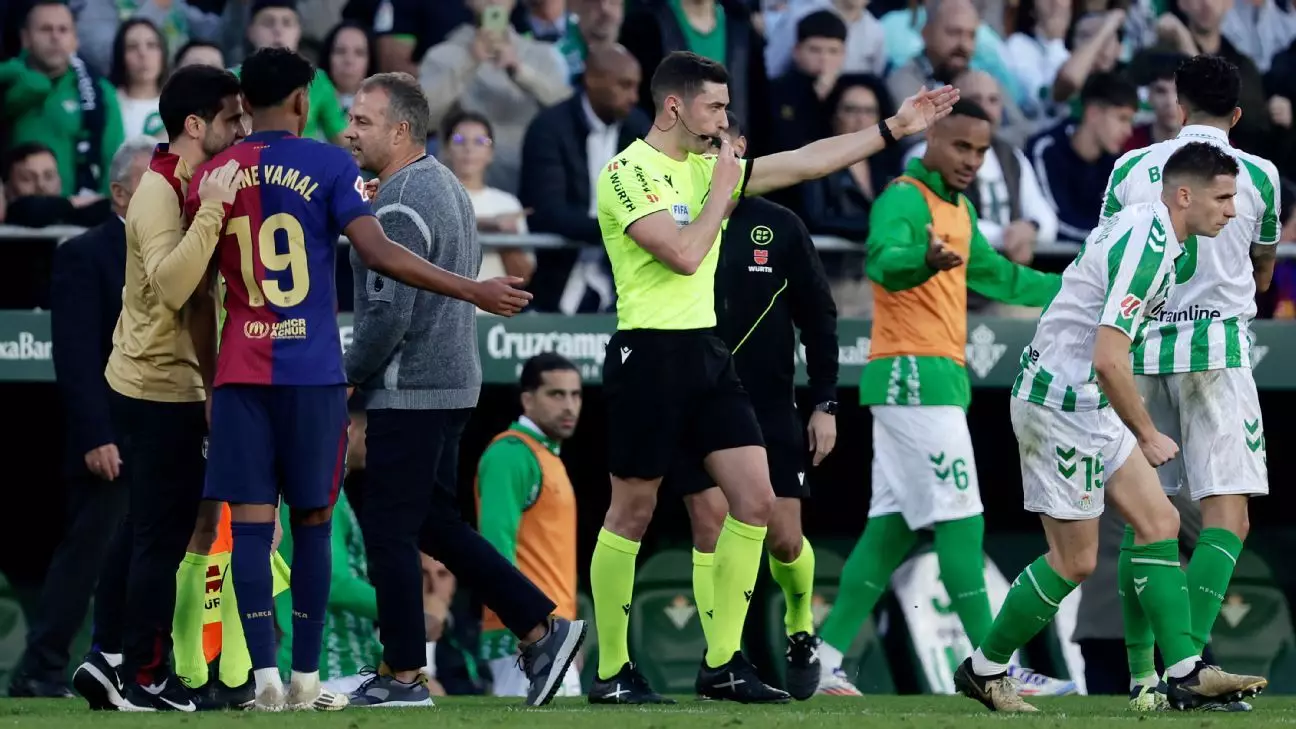In a match that should have solidified their position at the top, Barcelona found themselves embroiled in a disappointing 2-2 draw against Real Betis. Manager Hansi Flick highlighted the ongoing struggles of his squad after this match marked their fourth dropped points in five recent LaLiga outings. Despite taking the lead twice through Robert Lewandowski and Ferran Torres, Barcelona squandered opportunities and allowed two late responses from Betis, encapsulating a performance that Flick described as “really bad.”
Barcelona entered the match as league leaders, exuding confidence from their earlier standing. However, the current trend is alarming, as the team has only managed to convert one of their last five matches into three points. The pressure intensifies with their lead over second-placed Real Madrid shrinking drastically from nine points to just two. This loss of form raises critical questions about the team’s efficacy, tactical decisions, and the mental framework of the young players on the roster. Flick’s admission of needing significant improvement signals a burgeoning sense of urgency within the club.
One of the focal points of post-match analysis was Hansi Flick’s decision-making regarding substitutions. In a crucial moment of the match, he opted to replace key players such as Lewandowski and Raphinha, as well as midfield stalwarts Dani Olmo and Pedri. While preparing for an ensuing Champions League fixture against Borussia Dortmund is reasonable, such substitutions in a tightly contested match have raised eyebrows. The timing and rationale present a conundrum—was it a strategic foresight or an oversight driven by desperation? Flick justified the changes by emphasizing the necessity for fresh legs, yet the ramifications of these withdrawals meant Barcelona relinquished control of the game.
The turning point of the match transpired when Real Betis was awarded a penalty, converting it through Giovani Lo Celso after an incident involving Frenkie de Jong. The VAR review that preceded this decision frustrated Flick significantly, culminating in him receiving a red card for excessive protests—a decision he vehemently disputed. His sentiment of being unfairly treated reflects a deeper frustration as the match unraveled. The fact that such critical decisions can impact a team’s morale and performance cannot be overstated. Barcelona appeared disjointed after the controversial penalty incident, exhibiting signs of reactive play rather than a cohesive strategy.
Barcelona’s current squad incorporates several young talents, a strategy that echoes the club’s historic willingness to invest in youth development. However, relying heavily on inexperienced players can yield mixed results, as evidenced by their recent struggles. This blend of youthful exuberance and occasional naivety can lead to inconsistency—illustrated by their inability to close out matches when leading. Flick’s acknowledgment of needing improvement is not just a critique of tactical execution; it also highlights the need for these younger players to develop resilience and adaptability in high-stakes situations.
Barcelona’s situation calls for introspection as they gear up for crucial matches in both league and Champions League contexts. The combination of a newfound vulnerability in LaLiga and the pressures of European competition can illuminate the path forward for Flick and his team. With an urgent need to rectify tactical approaches and enhance player performance, Barcelona must rise from this disappointing stage, utilizing it as an opportunity for growth and learning.
As they regroup from this encounter, fans will hope that the team can channel their frustrations into productive training sessions. The stakes are considerable; revitalizing their form could be key to not just preserving their leadership in LaLiga, but also serving as a foundation in their quest for European glory. The challenge is no small feat, but the potential rewards are significant enough that Barcelona must rally and prove their mettle.

